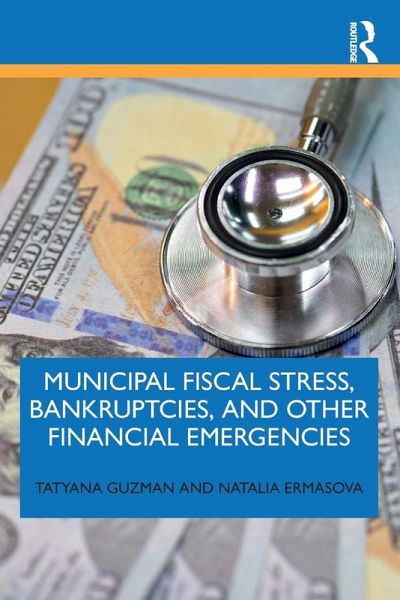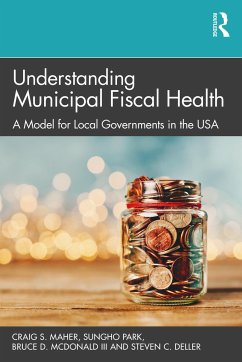
Municipal Fiscal Stress, Bankruptcies, and Other Financial Emergencies
Versandkostenfrei!
Versandfertig in 6-10 Tagen
46,99 €
inkl. MwSt.
Weitere Ausgaben:

PAYBACK Punkte
23 °P sammeln!
It is di fficult to find someone who has not heard about the Puerto Rico, Detroit, Michigan, or Orange County, California, bankruptcies. While guides for responsibly managing government finances exist, problems often originate not because of poor financial reporting or financial deficiencies but because issues external to financial wellbeing arise, such as economic, demographic, political, legal, or even environmental factors. Exacerbating the problem, there is not much advice in the existing literature on how to act when municipalities face financial struggles. Filling this important gap, thi...
It is di fficult to find someone who has not heard about the Puerto Rico, Detroit, Michigan, or Orange County, California, bankruptcies. While guides for responsibly managing government finances exist, problems often originate not because of poor financial reporting or financial deficiencies but because issues external to financial wellbeing arise, such as economic, demographic, political, legal, or even environmental factors. Exacerbating the problem, there is not much advice in the existing literature on how to act when municipalities face financial struggles. Filling this important gap, this book explores fiscal health and fiscal hardships, municipal defaults and bankruptcies, and many other aspects to help guide local governments during fiscal distress.
Fiscal hardships negatively affect the quality and availability of public goods and services and, consequently, the wellbeing of residents and businesses living and working in distressed municipalities. Turned off streetlights, unmaintained public parks, potholes, inconsistent garbage pickup, longer response time from emergency services, and multiple other issues that residents of the struggling municipalities deal with, lead to higher crime rates, lower quality of K-12 education, dangerous road conditions, lower housing values, outmigration of wealthier population, and numerous other problems. The COVID-19 pandemic put additional unprecedented pressure on municipal finances nationwide.
In this book authors Tatyana Guzman and Natalia Ermasova evaluate distressed cities and municipalities and provide practical recommendations on improving their financial conditions. What are conditions and signs to look for to not to find yourself in similar situations? What can be done if your municipality is already experiencing fiscal hardships? What are the consequences of fiscal misfortunes? How does one exit a fiscal emergency? This book answers these and other questions and serves as a guide tofiscal health and prosperity for U.S. municipal governments, students and researchers in public finance, and general public management fields.
Fiscal hardships negatively affect the quality and availability of public goods and services and, consequently, the wellbeing of residents and businesses living and working in distressed municipalities. Turned off streetlights, unmaintained public parks, potholes, inconsistent garbage pickup, longer response time from emergency services, and multiple other issues that residents of the struggling municipalities deal with, lead to higher crime rates, lower quality of K-12 education, dangerous road conditions, lower housing values, outmigration of wealthier population, and numerous other problems. The COVID-19 pandemic put additional unprecedented pressure on municipal finances nationwide.
In this book authors Tatyana Guzman and Natalia Ermasova evaluate distressed cities and municipalities and provide practical recommendations on improving their financial conditions. What are conditions and signs to look for to not to find yourself in similar situations? What can be done if your municipality is already experiencing fiscal hardships? What are the consequences of fiscal misfortunes? How does one exit a fiscal emergency? This book answers these and other questions and serves as a guide tofiscal health and prosperity for U.S. municipal governments, students and researchers in public finance, and general public management fields.














